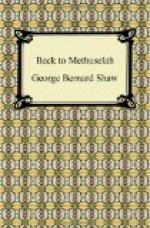into the coal cellar. We founded our religion,
our morality, our laws, our lessons, our poems, our
prayers, on that simple belief. Well, the moment
men became astronomers and made telescopes, their belief
perished. When they could no longer believe in
the sky, they found that they could no longer believe
in their Deity, because they had always thought of
him as living in the sky. When the priests themselves
ceased to believe in their Deity and began to believe
in astronomy, they changed their name and their dress,
and called themselves doctors and men of science.
They set up a new religion in which there was no Deity,
but only wonders and miracles, with scientific instruments
and apparatus as the wonder workers. Instead
of worshipping the greatness and wisdom of the Deity,
men gaped foolishly at the million billion miles of
space and worshipped the astronomer as infallible
and omniscient. They built temples for his telescopes.
Then they looked into their own bodies with microscopes,
and found there, not the soul they had formerly believed
in, but millions of micro-organisms; so they gaped
at these as foolishly as at the millions of miles,
and built microscope temples in which horrible sacrifices
were offered. They even gave their own bodies
to be sacrificed by the microscope man, who was worshipped,
like the astronomer, as infallible and omniscient.
Thus our discoveries instead of increasing our wisdom,
only destroyed the little childish wisdom we had.
All I can grant you is that they increased our knowledge.
ZOO. Nonsense! Consciousness of a fact is
not knowledge of it: if it were, the fish would
know more of the sea than the geographers and the
naturalists.
THE ELDERLY GENTLEMAN. That is an extremely acute
remark, madam. The dullest fish could not possibly
know less of the majesty of the ocean than many geographers
and naturalists of my acquaintance.
ZOO. Just so. And the greatest fool on earth,
by merely looking at a mariners’ compass, may
become conscious of the fact that the needle turns
always to the pole. Is he any the less a fool
with that consciousness than he was without it?
THE ELDERLY GENTLEMAN. Only a more conceited
one, madam, no doubt. Still, I do not quite see
how you can be aware of the existence of a thing without
knowing it.
ZOO. Well, you can see a man without knowing
him, can you not?
THE ELDERLY GENTLEMAN [illuminated] Oh how
true! Of course, of course. There is a member
of the Travellers’ Club who has questioned the
veracity of an experience of mine at the South Pole.
I see that man almost every day when I am at home.
But I refuse to know him.
ZOO. If you could see him much more distinctly
through a magnifying glass, or examine a drop of his
blood through a microscope, or dissect out all his
organs and analyze them chemically, would you know
him then?
THE ELDERLY GENTLEMAN. Certainly not. Any
such investigation could only increase the disgust
with which he inspires me, and make me more determined
than ever not to know him on any terms.




